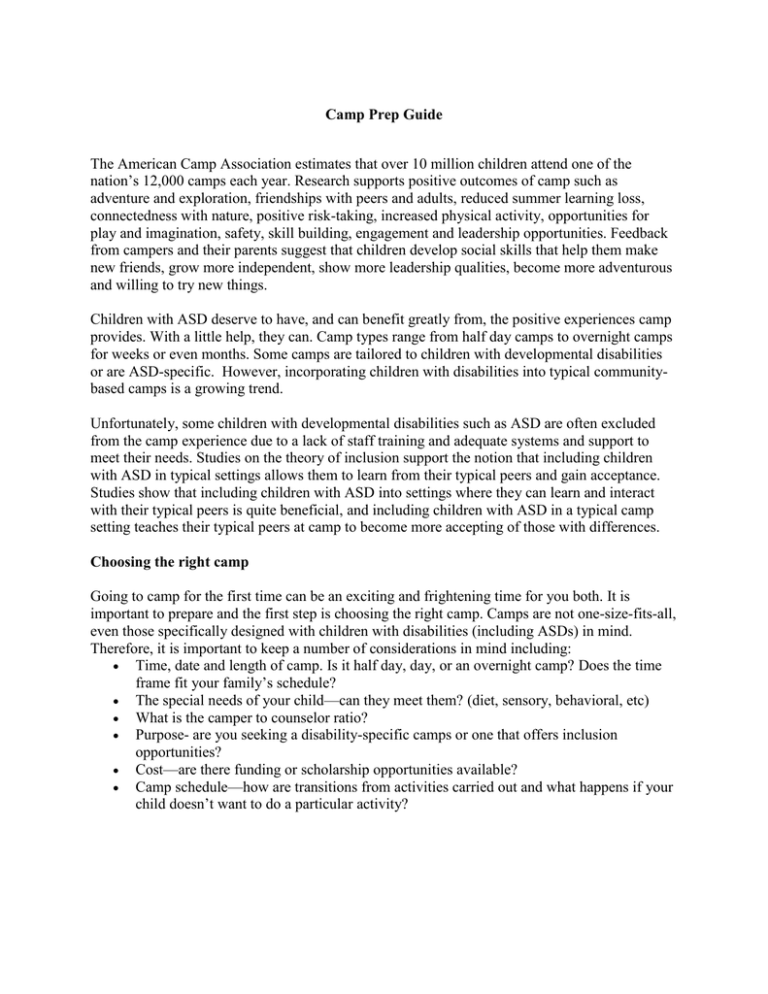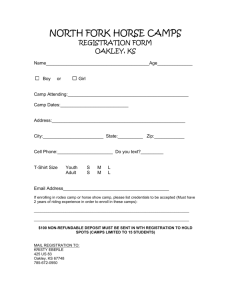Camp Prep Guide
advertisement

Camp Prep Guide The American Camp Association estimates that over 10 million children attend one of the nation’s 12,000 camps each year. Research supports positive outcomes of camp such as adventure and exploration, friendships with peers and adults, reduced summer learning loss, connectedness with nature, positive risk-taking, increased physical activity, opportunities for play and imagination, safety, skill building, engagement and leadership opportunities. Feedback from campers and their parents suggest that children develop social skills that help them make new friends, grow more independent, show more leadership qualities, become more adventurous and willing to try new things. Children with ASD deserve to have, and can benefit greatly from, the positive experiences camp provides. With a little help, they can. Camp types range from half day camps to overnight camps for weeks or even months. Some camps are tailored to children with developmental disabilities or are ASD-specific. However, incorporating children with disabilities into typical communitybased camps is a growing trend. Unfortunately, some children with developmental disabilities such as ASD are often excluded from the camp experience due to a lack of staff training and adequate systems and support to meet their needs. Studies on the theory of inclusion support the notion that including children with ASD in typical settings allows them to learn from their typical peers and gain acceptance. Studies show that including children with ASD into settings where they can learn and interact with their typical peers is quite beneficial, and including children with ASD in a typical camp setting teaches their typical peers at camp to become more accepting of those with differences. Choosing the right camp Going to camp for the first time can be an exciting and frightening time for you both. It is important to prepare and the first step is choosing the right camp. Camps are not one-size-fits-all, even those specifically designed with children with disabilities (including ASDs) in mind. Therefore, it is important to keep a number of considerations in mind including: Time, date and length of camp. Is it half day, day, or an overnight camp? Does the time frame fit your family’s schedule? The special needs of your child—can they meet them? (diet, sensory, behavioral, etc) What is the camper to counselor ratio? Purpose- are you seeking a disability-specific camps or one that offers inclusion opportunities? Cost—are there funding or scholarship opportunities available? Camp schedule—how are transitions from activities carried out and what happens if your child doesn’t want to do a particular activity? Preparing your child (and yourself!) for camp Explore the expectations Go over what is expected of your child during camp including: listening to and minding the camp counselors, following rules, and participating in activities. Role playing and social stories Prepare your child for situations that may occur during camp such as meeting new friends, activities, and transitions. Homesickness If it is an overnight camp, reassure your child that he or she can call and write home. Make sure to pack familiar items from home including items from their room: pillow, blanket, and a stuffed animal or toy. If it is a day camp, reassure them you will arrive every day at the end of the training to take them home and that you will bring them back in the morning. What to pack? Generally, overnight camps will provide a list of items children need to bring to camp with them. Day camps probably don’t require much in the way of packing, but some good ideas might be a familiar object from home such as a toy (if the child is young enough), snacks, water bottle, sunscreen, bug spray and/or a packed lunch. If you are unsure, ask. Check out the American Camp Association's Find a Camp: Searchable Camp Database here: http://find.acacamps.org/



